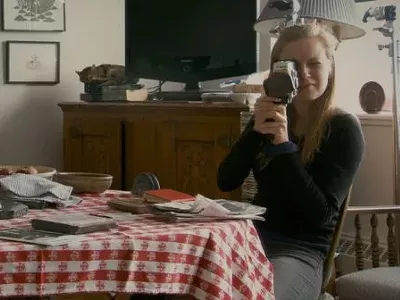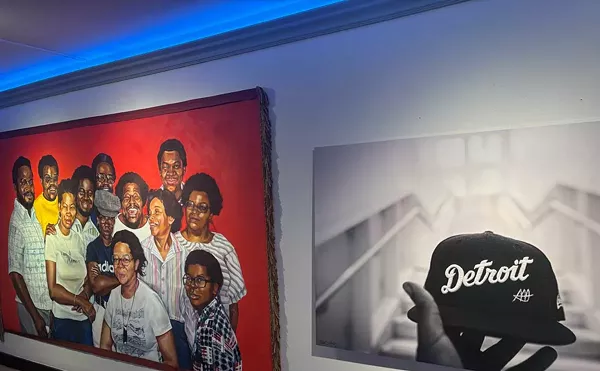The Art of the Deal
Pecha Kucha brings the art of precise presentation to fashionable Ferndale.

Audio By Carbonatix
[
{
"name": "GPT - Leaderboard - Inline - Content",
"component": "35519556",
"insertPoint": "5th",
"startingPoint": "3",
"requiredCountToDisplay": "3",
"maxInsertions": 100,
"adList": [
{
"adPreset": "LeaderboardInline"
}
]
}
]
One woman came to talk about a community-based attempt to photograph every house of worship in Detroit. A pair of college students from Toledo focused attention on volunteer efforts to build a bridge in a remote part of Honduras. There was a guy who highlighted a project that’s bringing art to building rooftops, and another who explained how his innovative T-shirt business got its start. And then there was the woman who came to tell people just how fabulous she and her life are.
One by one, they stepped up to a microphone last week at One-Eyed Betty’s, a bar and restaurant in Ferndale. Photos appeared on a screen behind them as they spoke. Twenty photos each, to be exact, each one flashing for 20 seconds, then on to the next so that each presentation lasted just six minutes and 40 seconds.
Welcome to Pecha Kucha, an event that began in Tokyo 10 years ago and has since brought the “art of precise presentation” to more than 500 cities around the world. Last week’s event in Ferndale was the 15th such gathering held in metro Detroit since 2008.
Roughly translated, the term PechaKucha means chitchat in Japanese. But the chatter, for the most part, is anything but idle. As the Detroit organizers say on their website, the intention is to “celebrate creative and business-minded talent that may not otherwise have an outlet to share their inspirations, creations and ways they’ve changed a community.”
The whole thing is run as a nonprofit, with local groups operating like franchises. The Detroit group stages four events a year. Attendees are asked for a $10 donation to help cover expenses. Several local sponsors also kick in.
As one of the organizers, Frank Nemecek says that last week’s event was in many ways fairly typical of the 14 “volumes” that preceded it. Featuring 10 presenters, there was a good mix of people promoting businesses, artistic projects and do-gooder efforts.
He points out that one of the features of the format and its time limit is that it keeps presenters from “droning on too long.”
You know how loquacious creative types can be when they are talking about a project they are into. On the other hand, if someone wants more information, there is plenty of opportunity to connect with a presenter during the customary intermission, or after the presentations have concluded.
One unusual aspect was the venue. Rather than a place like One-Eyed Betty’s, the presentations are more typically held at cultural institutions such as the DIA and the Charles H. Wright Museum of African American History. The next one, scheduled for Aug. 21, will be at the Hamtramck Public Library.
For Nemecek, another thing that set last week’s PechaKucha Night apart from the others was the fact that he finally made the leap to being a presenter himself.
A resident of the Warrendale neighborhood on Detroit’s far-west side, Nemecek began looking for ways to deal with the more than 1,000 empty homes in the immediate area. When he learned that there are more than 30,000 students attending Henry Ford Community College and UM’s Dearborn campus that would like to live in the area but couldn’t find housing, the solution clicked into place.
A nonprofit has been started with the intent of renovating empty homes and targeting students as renters.
“We’re picking up steam,” he says. “We’ve got a sponsor, and we’ve got some houses.”
After spending years watching others do it, what was it like to at last get up on the stage himself?
“I found that the process really helps you think about what you are doing,” he says. “If forces you to crystalize your thoughts, and how you are going to convey information, not only in words, but also with the images you attach to those words.”
Some people make their presentations in the hopes that it could lead to the funding of worthy projects. Katie Burns and Kyle Layton, for example, attend the University of Toledo, where they belong to the student chapter of a group called Engineers Without Borders.
During their six minutes and 40 seconds, they talked about Los Sanchez, a small village in Honduras that loses easy access to a nearby town when a nearby river swells during the rainy season. Kids can’t get to school, sick people have a hard time making it to the hospital, and buying food is difficult. A pedestrian bridge would make everyone’s lives infinitely easier. A creative, relatively low-cost span has been designed. Now all that’s needed is the $60,000 in materials required to actually construct the 180-foot bridge.
The one thing that links all of the PechaKucha participants is creativity. Architects, artists, photographers and designers of all stripes are drawn to the event.
Sometimes what people want to talk about is mostly themselves. That was the case for Detroiter Tene’ Dismuke, who says she started studying dance at the age of 4, then went on to become a model (she teaches at Barbizon) and writer (“I have three books in the can and am looking for a publisher,” she tells the crowd.) Among many other things, she runs a summer program for girls called Camp Fabulous. It is a place where girls ages 7 to 16 can develop both their performing arts talents and their self-esteem.
As Dismuke says, it is important to know that you don’t have to “apologize for being fabulous.”
To be considered as a presenter for the Aug. 21 event in Hamtramck, send 300 words on you and 300 words on your work; and a 5-megabyte sample (image, audio, video, whatever) to pkndetroit@gmail.com. More information can be found at pechakucha.org/cities/detroit.
Curt Guyette is Metro Times news editor. Contact him at 313-202-8004 or cguyette@metrotimes.com





